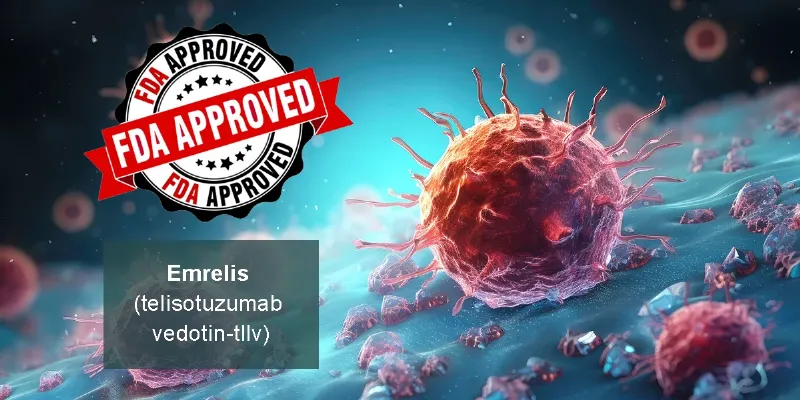FDA Approves Emrelis as the First Targeted ADC for High c-Met Expressing Lung Cancer

The FDA granted accelerated approval to Emrelis (telisotuzumab vedotin-tllv), the first targeted therapy for previously treated non-squamous NSCLC with high c-Met overexpression. Backed by Phase 2 LUMINOSITY trial results showing a 35% overall response rate and 7.2-month median response duration, Emrelis offers a new option for this hard-to-treat population with poor prognosis.
AbbVie announced a major advancement in biomarker-driven oncology: the U.S. Food and Drug Administration (FDA) has granted accelerated approval to Emrelis (telisotuzumab vedotin-tllv), a first-in-class antibody-drug conjugate (ADC), for adult patients with advanced non-squamous non-small cell lung cancer (NSCLC) who exhibit high c-Met protein overexpression and have received prior systemic therapy.
Alongside this approval, the FDA also authorized the VENTANA® MET (SP44) RxDx Assay from Roche Diagnostics. This companion diagnostic uses IHC to detect high c-Met protein overexpression and is required to identify patients eligible for treatment.
A Paradigm Shift in Oncology
"We have observed a paradigm shift in oncology in recent decades toward personalized, biomarker-driven therapeutics, allowing for better selection and optimized treatment outcomes," said Dr. Jonathan Goldman, professor of medicine, director of thoracic oncology clinical trials, UCLA. “People with c-Met overexpressing NSCLC have poor prognosis and limited treatment options, and Emrelis is a first-in-class ADC that can address a critical unmet need for this patient population.”
Emrelis is designed to directly target these tumor cells. The therapy is a c-Met-directed ADC that fuses a c-Met binding antibody to a cleavable linker and a cytotoxic agent (monomethyl auristatin E). This structure enables it to selectively deliver its chemotherapeutic payload to cancer cells with elevated c-Met, minimizing exposure to normal tissue and enhancing therapeutic specificity.
The LUMINOSITY Study
Emrelis earned its FDA nod through the accelerated approval pathway, based on results from the Phase 2 LUMINOSITY trial (NCT03539536). This open-label, multi-cohort study evaluated the efficacy of Emrelis in 84 patients with EGFR wild-type, non-squamous NSCLC and high c-Met overexpression who had undergone prior treatment.
Patients demonstrated a confirmed overall response rate (ORR) of 35% (95% CI: 24, 46), with a median duration of response (DOR) of 7.2 months (95% CI: 4.2, 12). Responses were determined by blinded independent central review per RECIST 1.1 criteria.
"Emrelis, AbbVie's first internally developed solid tumor medicine and our first solid tumor FDA approval in lung cancer," said Dr. Roopal Thakkar, EVP, R&D, Chief Scientific Officer, AbbVie. “Leveraging advanced technology and data science, we are growing our ADC portfolio designed to deliver the right medicines to the right patients in need across a range of difficult-to-treat tumors.”
Safety Profile
Adverse events observed in the trial were consistent with the known safety profile of ADCs. The most common reactions (≥20%) included peripheral neuropathy, fatigue, decreased appetite, and peripheral edema. Grade 3 or 4 laboratory abnormalities occurred in a minority of patients and included alterations in lymphocyte count, liver enzymes, electrolytes, and hemoglobin levels.
These early signals of efficacy, combined with a manageable safety profile, led to the therapy’s Breakthrough Therapy Designation in 2021 and subsequent priority review—part of the FDA’s Real-Time Oncology Review (RTOR) program, which streamlines the assessment of oncology drugs with promising clinical data.
What Comes Next?
The Phase 3 TeliMET NSCLC-01 study is currently underway, assessing Emrelis monotherapy in previously treated NSCLC patients with high c-Met expression. This global randomized trial is designed to validate the Phase 2 findings and potentially expand the drug’s indications.
About EMRELIS
EMRELIS™ (telisotuzumab vedotin-tllv) is a first-in-class antibody-drug conjugate (ADC) that targets c-Met protein, a receptor tyrosine kinase often overexpressed in non-small cell lung cancer (NSCLC) and associated with poor prognosis. It is approved for adults with previously treated, advanced or metastatic non-squamous NSCLC whose tumors show high c-Met overexpression. EMRELIS combines a c-Met-binding antibody with a cleavable linker and a cytotoxic payload (MMAE) to selectively attack cancer cells. A companion diagnostic test is required to determine eligibility. It is not approved for use in children, and its safety and efficacy in pediatric populations remain unknown.











Comments
No Comments Yet!